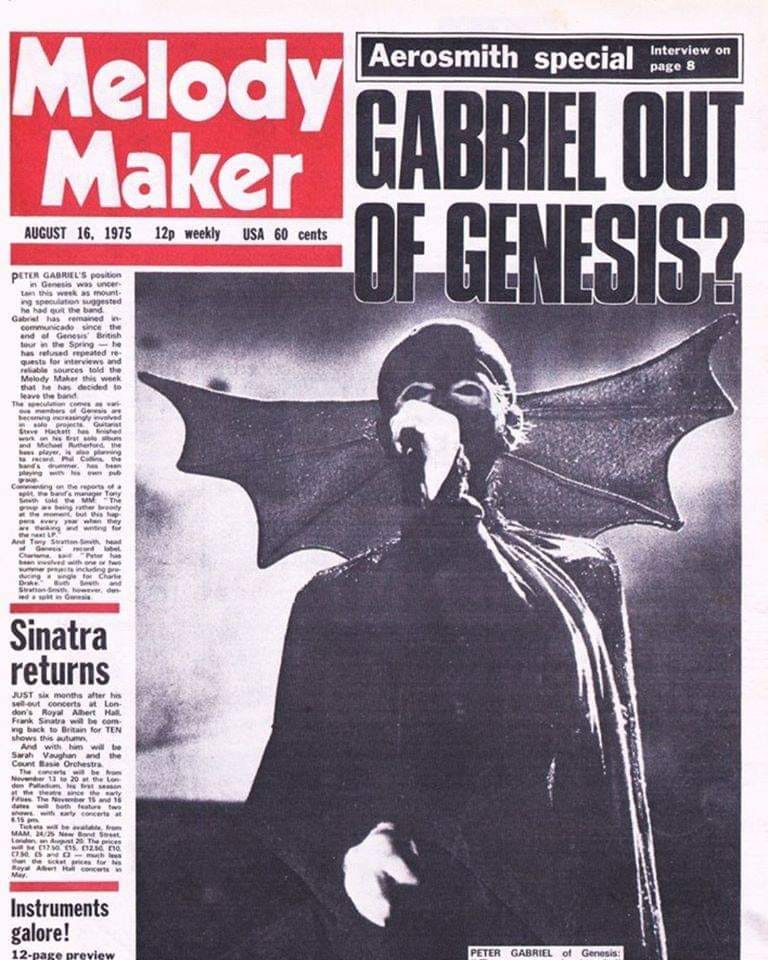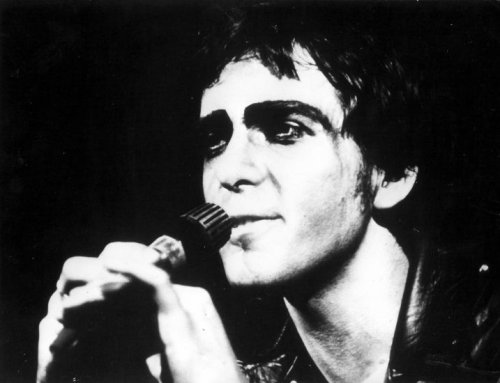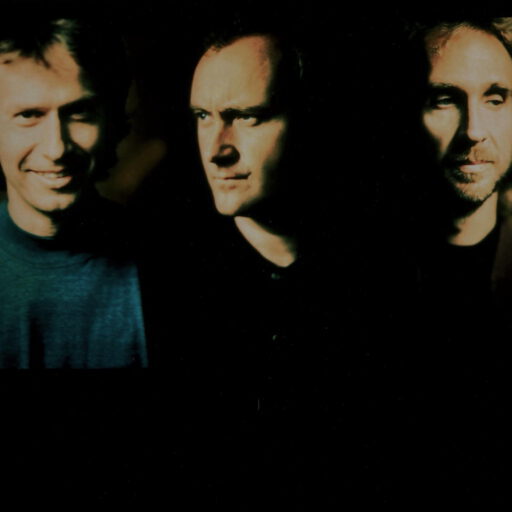On October 2, 1982, the legendary ‘Six Of The Best’ reunion show with Peter Gabriel and Genesis took place at Milton Keynes.
Continue reading “Six Of The Best”‘Gabriel Out Of Genesis?’ – Melody Maker 16th August 1975
The Melody Maker rumoured in its edition of 16 August 1975 about Peter Gabriel’s departure from Genesis.
Peter Gabriel left the band after the 1975 tour
After the The Lamb Lies Down On Broadway tour in 1975, lead singer Peter Gabriel left Genesis. The band did not announce his departure right away, but instead went into the studio to record what became their next album A Trick of The Tail and audition new singers. By August 1975, the press had heard rumours about Peter Gabriel’s decision to leave Genesis. On 16 August, the Melody Maker put a picture with him wearing the batwings on the cover and featured the headline GABRIEL OUT OF GENESIS?
Here’s the text from the Melody Maker’s front page:
GABRIEL OUT OF GENESIS?
PETER GABRIEL’S position in Genesis was uncertain this week as mounting speculation suggested he had quit the band.
Gabriel had remained incommunicado since the end of Genesis’ British tour in the Spring – he has refused repeated requests for interviews and reliable sources told the Melody Maker this week that he has decided to leave the band.
The speculation comes as various members of Genesis are becoming increasingly involved in solo projects. Guitarist Steve Hackett has finished work on his first solo album and Michael Rutherford, the bass player, is also planning to record. Phil Collins, the band’s drummer, has been playing with his own pub group.
Commenting on the reports of a split, the band’s manager Tony Smith told the MM: “The group are being rather broody at the moment, but this happens every year when they are thinking and writing for the next LP.“
And Tony Stratton-Smith, head of Genesis’ record label, Charisma, said: “Peter has been involved with one or two summer projects including producing a single for Charlie Drake.” Both Smith and Stratton-Smith, however, denied a split in Genesis.
Genesis manager Tony Smith first denied the rumours, but a week later, the band announced it officially and explained that they were searching for a new singer. Hardly did they know that the singer was already in the group: Their drummer Phil Collins. But that’s another story.
Title photo: Melody Maker 16 August 1975: Gabriel out of Genesis?
The Last Show of “The Lamb” Tour – and Peter Gabriel’s Final Genesis Gig
On May 22, 1975, Genesis played the final show of their ambitious The Lamb Lies Down on Broadway tour. It would also mark the last time Peter Gabriel performed with the band as lead vocalist.
The Lamb Lies Down On Broadway: A Bold New Chapter
In 1974, Genesis entered the studio to record their most ambitious project yet: The Lamb Lies Down on Broadway. The double concept album told a surreal and complex story by Peter Gabriel, following a Puerto Rican teenager named Rael as he journeys through a strange underworld beneath New York City.
The urban American setting was a dramatic shift from the band’s earlier tales rooted in British folklore and fantasy. After touring North America, Genesis were aiming to break into the U.S. market. The Lamb was also their first true concept album (after an unsuccessful attempt on their debut), a hallmark of many progressive rock bands at the time.
Internally, however, tensions were mounting. Gabriel wrote all the lyrics and developed the story independently, while Tony Banks, Mike Rutherford, and Phil Collins composed most of the music during jam sessions at Headley Grange. Steve Hackett’s contributions were minimal, and the creative disconnect between words and music created friction. Only one track, “The Light Dies Down on Broadway”, had lyrics penned by Banks and Rutherford instead of Gabriel.
Behind-the-Scenes Tensions
Two key factors contributed to Gabriel’s growing estrangement from the band. First, he had attracted interest from The Exorcist director William Friedkin, who was keen to collaborate on a film. Gabriel was tempted, even considering leaving the band, but the project never materialized.
Second, Gabriel’s wife Jill gave birth to their first daughter, Anna, in July 1974. Complications following the birth drew Gabriel further away from the group. He was the first member to start a family, and this life change made him reassess his priorities and see a future beyond the band. His inner conflict bled into The Lamb‘s narrative, for example in the song “In the Cage,” where Rael cries, “Get me out of this cage!”
Upon release, The Lamb Lies Down on Broadway received mixed reviews and was commercially underwhelming. Ticket sales for the tour were below expectations, and several shows were cancelled. Though the album is now revered as a cult classic, its reception at the time was disappointing, particularly for Gabriel, who had poured his heart into the concept.
A Tour Like No Other
The band made the bold decision to perform the album in full on tour, even before many fans had a chance to hear it. Gabriel, already known for his theatrical costumes, pushed the visual spectacle even further, but it came at a cost. His elaborate outfits, including the infamous “Slipperman” costume, sometimes muffled his vocals or distracted from the music itself. The rest of the band grew frustrated, feeling the show had become more about theatrics than sound.
Technical problems were frequent. The stage used projected slides to accompany the story, but they often jammed or displayed out of sequence. In one infamous incident, a Peter Gabriel dummy meant to mirror him on stage was mysteriously swapped for a naked roadie. And during a song that required a small explosion, the production manager accidentally triggered a huge blast so loud that the band stopped mid-song. Peeking through the curtain, the crew member sheepishly said, “Sorry,” to which Phil Collins yelled, “You’re fired!”
Gabriel’s Departure
Midway through the tour, Gabriel made the decision to leave Genesis. Their manager Tony Smith was not surprised, but asked him to finish the remaining dates before making it public.
Gabriel’s final show with Genesis took place in Saint-Étienne, France, in May 1975. Ironically, it wasn’t meant to be the last show, but the scheduled final concert was canceled at the last minute. And so, without much fanfare, Peter Gabriel’s time with Genesis came to an end.
He had co-founded the band in 1967 alongside Tony Banks, Mike Rutherford, and Anthony Phillips. His departure, announced later that year, shocked fans and cast doubt over the band’s future. Could Genesis survive without their charismatic frontman?
As history would show — they could. And so could he.
Photo: Peter Gabriel in 1975. Photographer unknown. https://commons.wikimedia.org/wiki/File: Peter_Gabriel,_April_1975.jpg. Unknown author / CC0 (https://creativecommons.org/licenses/by/3.0).
Phil Collins’ Departure from Genesis in 1996
On March 28, 1996, Genesis officially announced Phil Collins’ departure in a press release titled: “Genesis end twenty-year experiment, decide to replace Peter Gabriel as vocalist.”
It marked the end of an era. But the story of Phil’s (temporary) exit began long before that.
Phil Collins Had Made Up His Mind in 1993
By 1993, Genesis were at their peak. The massive We Can’t Dance tour had wrapped up the previous year, and in the fall of ’93, the band performed at Cowdray Ruins, a charity concert alongside Pink Floyd, Queen, and Eric Clapton. Genesis played a short set and joined the all-star lineup for the encore. No one realized it would be Phil Collins’ last performance with the band for a long time.
At the time, Phil was already deep into writing what would become his most personal solo album, Both Sides. He played every instrument and produced the album himself, much like he had done on Face Value. The deeply introspective songs reflected his personal turmoil – his marriage to Jill was falling apart due to his affair with childhood sweetheart Lavinia Lang. With his family on the verge of breaking up again, he found it increasingly difficult to sing Genesis songs. He wanted to write and perform music that truly reflected his own emotions.
A New Chapter, a New Life in Switzerland
Sometime after the Cowdray Ruins gig, Phil confided in manager Tony Smith about his desire to leave Genesis. But Smith, ever the businessman, encouraged him to finish his solo album and tour first—then decide.
Phil embarked on the Both Sides world tour in 1994 and 1995, during which he met Orianne Cevey in Switzerland. Falling in love, he decided to leave England and settle in Lake Geneva. The British press harshly criticized him – both for his music and his personal life. He grew to resent his ‘Mr. Nice Guy’ image and felt increasingly distant from Genesis.
Tony Banks and Mike Rutherford Decide to Carry On
In 1996, the band convened in Tony Smith’s kitchen, where Phil finally made it official – he was leaving Genesis.
Tony Banks reacted with typical British understatement: “It’s a sad day, a very sad day.”
Mike Rutherford, on the other hand, was more surprised that Phil had stayed as long as he did given his highly successful solo career.
On March 28, 1996, exactly twenty years and two days after his first show as Genesis’ lead singer, the news went public. With Phil’s departure, Genesis lost not just their frontman and entertainer, but also a brilliant composer and drummer.
Still, Tony and Mike decided to continue, eventually searching for a new singer. Meanwhile, Phil focused on his solo career, though his success never quite reached the heights of the 1980s.
Despite going their separate ways, the three remained close. By the early 2000s, they occasionally reunited for special appearances. Then, a decade after Phil’s departure, Genesis officially came back together for the 2007 Turn It On Again tour.
But that’s another story.
Title photo: The world famous band – Genesis. Tony Banks, Phil Collins and Mike Rutherford. (Photo 1991) . Source: Wikimedia Commons, David Scheinmann / CC BY (https://creativecommons.org/licenses/by/3.0).
Face Value (1981) – Phil Collins
In February 1981, Phil Collins unveiled his debut solo album, Face Value, marking a significant departure from his role as Genesis’s frontman. The album not only showcased Collins’s personal and musical evolution but also cemented his status as a prominent solo artist in the 1980s.
Genesis and Personal Turmoil
By 1978, Collins had transitioned from Genesis’s drummer to its lead vocalist. The band’s 1978 album, …And Then There Were Three…, featured the hit “Follow You Follow Me,” signaling a shift towards more concise and direct songs. During this period, Collins faced personal challenges; his wife, Andrea, threatened to leave due to his extensive touring commitments. Upon returning from a tour, Collins discovered that Andrea had moved to Canada with their children. Despite efforts to reconcile, including a move to Vancouver, the marriage ended in divorce.
Creation of Face Value
In the aftermath of his divorce, Collins channeled his emotions into music. He set up a home studio in Surrey, equipped with a piano, drum machine, and an 8-track tape recorder. Here, he began crafting demos that delved into his personal experiences. When Genesis regrouped to work on their 1980 album, Duke, Collins presented some of these demos. Two tracks, “Misunderstanding” and “Please Don’t Ask,” were included in the album. Encouraged by the positive reception, Collins decided to pursue a solo project, collaborating with producer Hugh Padgham to develop his demos into a full-length album.
Musical Diversity and Notable Tracks
Face Value is a tapestry of various musical styles, reflecting Collins’s diverse influences. The opening track, “In the Air Tonight,” is renowned for its haunting atmosphere and the iconic drum break that has since become legendary. The song’s lyrics were largely improvised, capturing the raw emotion of the moment.
Another standout track, “I Missed Again,” introduces a brass section featuring the Phenix Horns, known for their work with Earth, Wind & Fire. This collaboration infused the song with a vibrant, funky energy, a sound that would become a hallmark of Collins’s future solo endeavors.
The album also explores a range of genres:
“The Roof Is Leaking”: A track with Delta blues and country influences, adding to the album’s eclectic nature.
“You Know What I Mean”: A poignant ballad showcasing Collins’s vulnerability, accompanied solely by piano and vocals.
“Hand in Hand”: An instrumental piece blending jazz and world music elements, highlighting the talents of the assembled musicians.
Commercial Success and Legacy
Upon its release, Face Value received critical acclaim and achieved significant commercial success. The album topped the UK Albums Chart for three weeks and reached No. 7 on the US Billboard 200. It has since sold over 5 million copies in the US and over 1.5 million in the UK. The success of Face Value not only established Collins as a solo artist but also set the stage for a series of successful albums throughout the 1980s.
In retrospect, Face Value stands as a testament to Phil Collins’s ability to translate personal adversity into a universally relatable and sonically diverse album. Its enduring appeal lies in its raw emotion, innovative production, and the seamless fusion of various musical styles.





